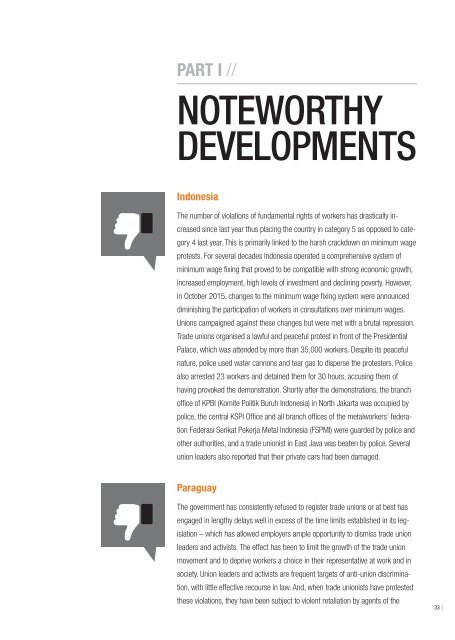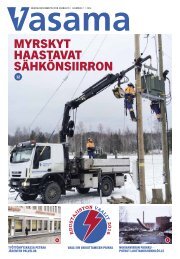ITUC GLOBAL RIGHTS INDEX
1RZ0UUH
1RZ0UUH
You also want an ePaper? Increase the reach of your titles
YUMPU automatically turns print PDFs into web optimized ePapers that Google loves.
PART I //<br />
NOTEWORTHY<br />
DEVELOPMENTS<br />
Indonesia<br />
The number of violations of fundamental rights of workers has drastically increased<br />
since last year thus placing the country in category 5 as opposed to category<br />
4 last year. This is primarily linked to the harsh crackdown on minimum wage<br />
protests. For several decades Indonesia operated a comprehensive system of<br />
minimum wage fixing that proved to be compatible with strong economic growth,<br />
increased employment, high levels of investment and declining poverty. However,<br />
in October 2015, changes to the minimum wage fixing system were announced<br />
diminishing the participation of workers in consultations over minimum wages.<br />
Unions campaigned against these changes but were met with a brutal repression.<br />
Trade unions organised a lawful and peaceful protest in front of the Presidential<br />
Palace, which was attended by more than 35,000 workers. Despite its peaceful<br />
nature, police used water cannons and tear gas to disperse the protesters. Police<br />
also arrested 23 workers and detained them for 30 hours, accusing them of<br />
having provoked the demonstration. Shortly after the demonstrations, the branch<br />
office of KPBI (Komite Politik Buruh Indonesia) in North Jakarta was occupied by<br />
police, the central KSPI Office and all branch offices of the metalworkers’ federation<br />
Federasi Serikat Pekerja Metal Indonesia (FSPMI) were guarded by police and<br />
other authorities, and a trade unionist in East Java was beaten by police. Several<br />
union leaders also reported that their private cars had been damaged.<br />
Paraguay<br />
The government has consistently refused to register trade unions or at best has<br />
engaged in lengthy delays well in excess of the time limits established in its legislation<br />
– which has allowed employers ample opportunity to dismiss trade union<br />
leaders and activists. The effect has been to limit the growth of the trade union<br />
movement and to deprive workers a choice in their representative at work and in<br />
society. Union leaders and activists are frequent targets of anti-union discrimination,<br />
with little effective recourse in law. And, when trade unionists have protested<br />
these violations, they have been subject to violent retaliation by agents of the<br />
33 |



